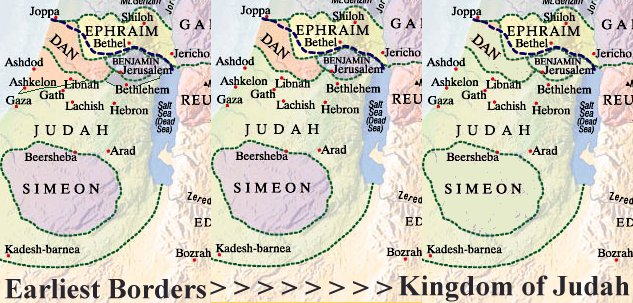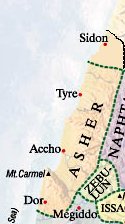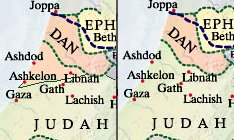|
|
|
|
 CHAPTER 1
CHAPTER 1
 Judah, Simeon, and Joseph continue to conquer Canaanites—Remnants of Cananites remain in lands of Judah, Manasseh, Ephraim, Zebulun, Asher, Naphtali, and Dan. |
||
|
1 Now after the death of Joshua it came to pass, that the
children of Israel asked the LORD, saying, Who shall go up for us
against the Canaanites firsta, to
fight against them?
2 And the LORD said, Judah shall go up: behold, I have delivered the land into his hand. 3 And Judah said unto Simeon his brother, Come up with me into my lot, that we may fight against the Canaanites; and I likewise will go with thee into thy lot. So Simeon went with him. |
1a Who shall go up for us against the Canaanites first Of the two princes of the tribes of Israel who survived the 40 years in the wilderness, one was Joshua and the other was Caleb. Joshua was now dead. Whether by direct command of the Lord or by assumed leadership, it was the Judah under the direction of Caleb (see verses 11 & 12) who did mount the fight against the Canaanites 'first', after the death of Joshua. However, Judah was not alone. Judah would confederate with Simeon while the other tribes did also fight against the Canaanites, the particulars are not as well expressed by this Jewish prepared account. | |
Judah, Allied with Simeon, Fights First under Caleb |
||
|
4 And Judah went up; and the LORD delivered the
Canaanites and the Perizzites into their hand: and they slew of them in Bezek
aten thousand men.
5 And they found Adoni-bezek in Bezek: and they fought against him, and they slew the Canaanites and the Perizzites. 6 But Adoni-bezeka fled; and they pursued after him, and caught hima, and cut off his thumbs and his great toes. |
6a Adonibezek ... caught him Though Judah with Simeon has some sucess in fighting the Canaanites, it is clear that they are not driving them out of the land or unterly destroying them. They Lord over them and subjegate them, but the Canaanites are still with them, just as they are quick to point out concerning other tribes who also fight against the Canaanites. | |
|
7 And Adoni-bezek said, aThreescore
and ten kings, having their thumbs and their great toes cut off, gathered
their meat under my table: as I have done, so God hath requited me.
And they brought him to Jerusalem, and there he died.
8 Now the children of Judah had fought against Jerusalem, and had taken ita, and smitten it with the edge of the sword, and set the city on fire. |
8a Judah had fought against Jerusalem, and had taken it Here again, though Judah seems to win battles and 'conquer', Judah does not remove or utterly destroy the Canaanites. This great feat of taking Jerusalem and setting it on fire is later revealed to not be concise nor conclusive as the Jebusites are later stated to still be living there with the tribe of Benjamin, thus faulting Benjamin, though they brag that they had taken Jerusalem at one time under Caleb. | |
|
9 ¶ And afterward the children of Judah went down to fight against the Canaanites, that dwelt in the mountain, and in the south, and in the valley.
10 And Judah went against the Canaanites that dwelt in Hebron: (now the name of Hebron before was Kirjath-arba:) and they slew Sheshai, and Ahiman, and Talmai. |
||
|
11 And from thence he went against the inhabitants of Debir: and the name of Debir before was Kirjath-sepher:
12 And Caleb said, He that smiteth Kirjath-sepher, and taketh it, to him will I give Achsah my daughter to wife. 13 And Othniel the son of Kenaz, Caleb's younger brother, took it: and he gave him Achsah his daughter to wife. |
||
|
14 And it came to pass, when she came to him, that she moved him to ask of her father a field: and she lighted from off her ass; and Caleb said unto her, What wilt thou?
15 And she said unto him, Give me a blessing: for thou hast given me a south land; give me also springs of water. And Caleb gave her the upper springs and the anether springs. |
||
Moses' In-laws, Judah, and Canaanites Live Together |
||
|
16 ¶ And the children of the
aKenitea, Moses'
father in law, went up out of the bcity of palm trees
with the children of Judaha
into the wilderness of Judah, which lieth in the south of Arad; and
they went and dwelt among the
peoplea.
17 And Judah went with Simeon his brother, and they slew the Canaanites that inhabited Zephath, and utterly destroyed it. And the name of the city was called Hormah. |
16a the Kenite ... with the children of Judah ... they went and dwelt among the people Here it states that rather than remove and/or destroy the Canaanite, Judah and associates, would dwell among them. | |
|
18 Also Judah took Gaza with the
acoast thereof, and Askelon with the coast thereof, and
Ekron with the coast thereof.
19 And the LORD was with aJudah; and he drave out the inhabitants of the mountain; but could not drive out the inhabitants of the valley, because they had bchariots of iron. 20 And they gave Hebron unto Caleb, as Moses said: and he expelled thence the three sons of Anak. |
||
Benjamin Charged with Living with Jebusites
after |
||
|
21 And the children of Benjamin did not
adrive out the bJebusites that
inhabited Jerusalema; but the
cJebusites dwell with the children of Benjamin in Jerusalem
unto this dayb.
|
21a the Jebusites that inhabited
Jerusalem Despite the report found in verse 8 that 'Judah had
fought against Jerusalem, and had take it, and smitten it with the edge of
the sword, and set the city on fire', it is evident that Judah did not
conquer at length, or remove the Jebusites from Jerusalem. And in verse 21,
the Jewish perspective turns and lays upon Benjamin, which would have become
a diminished tribe in size, the blame that the Jebusites had not been
removed from Jerusalem. This inspite of the additional fact that it was
King David who would eventual wrestle Jerusalem from Jebusite control and
rule.
21b unto this day It becomes obvious that whatever more ancient and more contemporay records of events have been compiled and edited when throughout such later commentary is obviously added such as this statement that 'unto this day', this much later day, Benjamin and the Jebusites still dwell in Jerusalem. I would have to suppose that Judah also dwelt in Jerusalem at this later date also, but dispite their first claimed taking of Jerusalem under Caleb before anyother, and their later takeing of Jerusalem under King David, it was just as decidedly a Jewish failure to remove and/or exterminate the Jebusites as it was the reduced tribe of Benjamin from whom the Jews would extract and claim much land from. |
|
 | ||
Judah's Land EvolutionFrom what Joshua stipulated and Moses precribed, that the land inheritances of the tribes of Israel were and should always remain, there comes the evolution of the lands claimed and possed by Judah, which were ever increasing and infringing upon the land inheritance of the other tribes. Dan seems to have been completely squeezed out of the tribes of Israel picture. The lands of Benjamin were also swallowed up by Judah as was those of Simeon by the time of the division of the two Kingdoms of Israel and Judah. | ||
House of Joseph Takes Bethel, the Old Luz |
||
|
22 ¶ And the house of Joseph, they also went up against Beth-el: and the LORD was with them.
23 And the house of Joseph sent to descry Beth-el. (Now the name of the city before was Luz.) |
||
|
24 And the spies saw a man come forth out of the city, and they said unto him, Shew us, we pray thee, the entrance into the city, and we will shew thee mercy.
25 And when he shewed them the entrance into the city, they smote the city with the edge of the sword; but they let go the aman and all his family. 26 And the man went into the land of the Hittites, and built a city, and called the name thereof Luz: which is the name thereof unto this day. |
||
Manasseh Charged with Not Driving Out Canaanites |
||
|
27 ¶ Neither did Manasseh
adrive out the inhabitants of Beth-shean and her
towns, nor Taanach and her towns, nor the inhabitants of Dor and her towns,
nor the inhabitants of Ibleam and her towns, nor the inhabitants of Megiddo
and her towns: but the Canaanites would dwell in that land.
28 And it came to pass, when Israel was strong, that they put the Canaanites to atribute, and did not utterly drive them out. |
||
Ephraim Charged with Not Driving Out Canaanites |
||
|
29 ¶ Neither did Ephraim drive out the
aCanaanites that dwelt in Gezer; but the Canaanites dwelt
in Gezer among them.
|
||
Zebulun Charged with Not Driving Out Canaanites |
||
| 30 ¶ Neither did Zebulun drive out the inhabitants of Kitron, nor the inhabitants of Nahalol; but the Canaanites dwelt among them, and became tributaries. | ||
Asher Charged with Not Driving Out Canaanites |
||
|
31 ¶ Neither did Asher drive out the inhabitants of
Accho, nor the inhabitants of
Zidona, nor of Ahlab, nor of
Achzib, nor of Helbah, nor of Aphik, nor of Rehob:
32 But the Asherites dwelt among the Canaanites, the inhabitants of the land: for they did not drive them out. |
31a Like many of the tribes, Asher did
not expand its lands to the fullest extent of it inheritance as prescribed
by Joshua (See Joshua 19:24-31 esp. v. 28) as it is stated that Asher was
 to expand to and included 'even unto the great Zidon'. Both Zidon and Tyre
continued to be the land and cities of the Phoenecians.
to expand to and included 'even unto the great Zidon'. Both Zidon and Tyre
continued to be the land and cities of the Phoenecians.
|
|
Naphtali Charged with Not Driving Out Canaanites |
||
|
33 ¶ Neither did Naphtali drive out the inhabitants of Beth-shemesh, nor the inhabitants of Beth-anath; but he dwelt among the Canaanites, the inhabitants of the land: nevertheless the inhabitants of Beth-shemesh and of Beth-anath became tributaries unto them.
|
||
Amorites Prevail Against Dan |
||
|
34 And the Amorites forced the children of Dan into the
mountain: for they would not suffer them to come down to the
valleya:
35 But the Amorites would dwell in mount Heres in Aijalon, and in Shaalbim: yet the hand of the house of Joseph prevailed, so that they became tributaries. 36 And the coast of the Amorites was from the going up to Akrabbim, from the rock, and upward. |
34a would not suffer them to come down to the valley This valley being spoken of is the Valley of Ajalon or Aijalon. It was the valley which ran from Jerusalem westward toward the Mediterranean (see Joshua 10:12-14: 19:42). While Dan was not allowed to inhabit this part of their inheritance, the House of Joseph, that is Israel, the Northern Kingdom, did subjecate these people and made them tributaries. The simularity between the name Ajalon or Aijalon Valley and the port city of Ashkelon is too similar to ignore. And while Judah is attributed as defeating Ashkelon, the port city (verse 18), as they were also attributed as taking Jerusalem (verse 8), it is felt that just as Jerusalem was part of Benjamin's inheritance, that Ashkelon as the extention of the Ajalon/Aijalon Valley was part of the original inheritance of Dan (See Joshua 19:42). |
 |